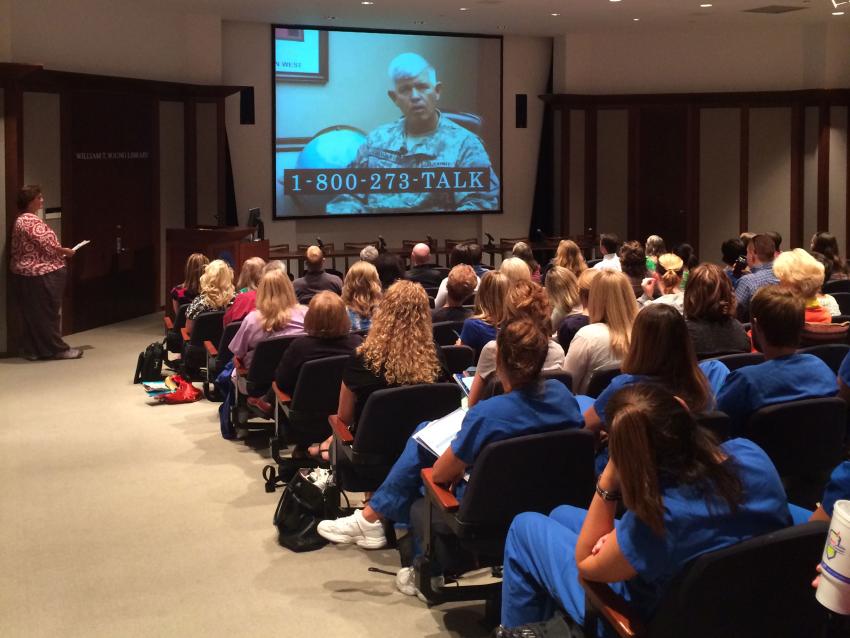
Nursing students attend suicide prevention conference
Three clinical groups from NUR 401 Psychiatric Mental Health Nursing and their instructors attended the Suicide Prevention Conference: Raising Awareness & Sharing Our Stories Featuring Carol Graham on Tuesday, Sept. 1.
The University of Kentucky Office of Work-Life presented the one-day conference at the William T. Young Library. The event featured a talk by Kentucky native, Carol Graham, who shared her own personal story of loss.
Carol Graham, wife of retired Army Major General Mark A. Graham, has traveled the world explaining how she has coped with the deaths of her two sons. Together, Graham and her husband wrote a book called, "The Invisible Front: Love and Loss in an Era of Endless War," which focuses on their fight against the armed forces' suicide epidemic.
As advocates for injured soldiers and their families, the Grahams continue to raise awareness of the risks of untreated depression, post-traumatic stress disorder (PTSD) and traumatic brain injury (TBI). At UK, the couple began the Jeff and Kevin Graham Memorial Fund to provide education on awareness of depression and suicide prevention. Kevin was a senior at UK when he committed suicide June 21, 2003. Jeffrey, the Grahams’ oldest son, was a scholarship student who graduated from UK. He lost his life while leading his platoon on patrol in Khaldiyah, Iraq, Feb. 19, 2004.
Following Graham's talk, a panel discussion with a Q&A session featured the following experts:
- Mary Bolin, director of UK Counseling Center;
- Julie Cerel, associate professor of social work at UK College of Social Work;
- Melinda Moore, ssistant professor of psychology at Eastern Kentucky University Department of Psychology and Kentucky Suicide Prevention Group chair;
- Rebecca Sanford, clinical faculty member at UK College of Social Work and Survivors of Suicide group facilitator; and
- Dr. Todd Cheever, director of the Associate Residency Program and assistant dean for student affairs at UK College of Medicine.
Following the presentation featuring Graham, the conference offered QPR (Question. Persuade. Refer.) gatekeeper training led by Bolin, a well-known national expert in QPR training, who believes the key to helping with suicide prevention is communication and overcoming the stigma of talking to someone. Individuals with QPR training know how to recognize the warning signs of a suicide crisis and how to question, persuade and refer someone to help.
"Our culture is changing to where we can at least talk about it. The only way for suicide to change is for people to be open and discuss how they're feeling, without being labeled as crazy. Anytime there's a suicide attempt or a death it impacts people. To me that’s the bottom line," she said.
Bolin believes anyone can be trained to pick up on the warning signs from an at-risk person. With young adults, such as college students, family and friends need to be more aware as they tend to be more impulsive with suicidal thoughts, believing something like a failing grade or a DUI arrest is a hopeless situation.
"If you can't imagine a future or a better future, then you're hopeless. If you're hopeless, then you can't see a different or better future. Hopelessness is the biggest predictor of suicide," she said.
The conference's second breakout session was a journaling workshop led by licensed clinical social worker Ann Bassoni, coordinator of UK Work+Life Connections, and Rhonda Henry, director of the Violence Intervention and Prevention Center. Studies have shown that by periodically writing down your thoughts and feelings individuals can manage stress and physical well-being. This workshop focused on the therapeutic effects of keeping a journal.
Participants of this session also learned how to process grief and trauma and the positive outcomes that can be incorporated into everyday life from journaling.
Suicide prevention is a widespread issue. In 2013, 41,149 persons in the U.S. died by suicide (up from 40,600 in 2012); that compares to 16,121 who died by homicide.
